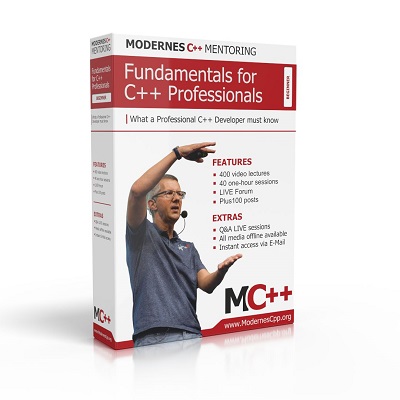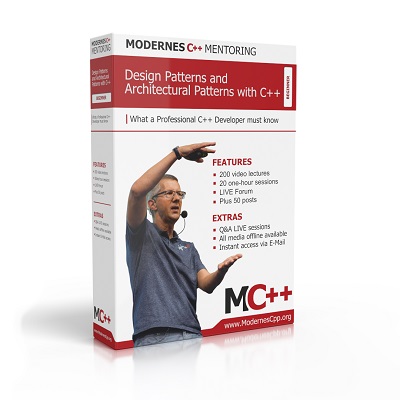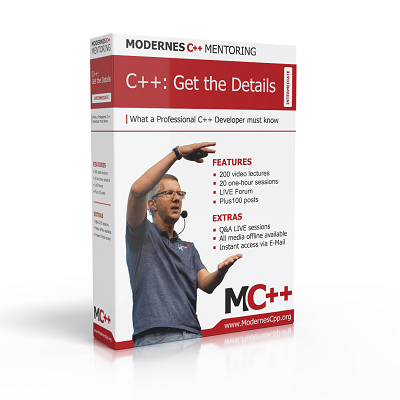Stay Informed about my Mentoring
Rezensionen
Vorträge
Videos
Tutorial
Besucher
Heute 585
Gestern 3080
Woche 12032
Monat 42787
Insgesamt 4050283
Aktuell sind 474 Gäste und keine Mitglieder online
Abonniere den Newsletter (+ pdf Päckchen)
Alle Tags
- Acquire-Release-Semantik
- allocator
- Anweisungen
- Arithmetik
- array
- Assoziative Container
- Atomare Datentypen
- atomic_thread_fence
- Ausdrücke
- Ausnahmen
- auto
- Bedingungsvariablen
- Benutzerdefinierte Literale
- Bit-Manipulationen
- casts
- Concepts
- constexpr
- Coroutinen
- CppMem
- decltype
- Deklarationen
- enum
- Fehlerbehandlung
- final
- finally
- format
- forward
- Funktionen
- Guideline Support Library
- if
- Initialisierung
- inline
- Interfaces
- Klassen
- Klassenhierachien
- Kontrakte
- Konvertierungen
- Lambdas
- lock-frei
- Locks
- Module
- Monaden
- move
- Mutexe
- new/delete
- noexcept
- nullptr
- optional
- override
- Parallel
- Performanz
- Plain Old Data
- Quelldateien
- RAII
- Ranges-Bibliothek
- Relaxed-Semantik
- Semaphoren
- Sequenzielle Konsistenz
- shared_ptr
- Singleton
- Smart Pointer
- Spaceship
- Speicher
- static_assert
- string
- Sukzessive Optimierung
- switch
- Tasks
- Template Metaprogrammierung
- Templates
- Threadlokal
- ThreadSanitizer
- time
- Type Erasure
- Type-Traits
- Überladen
- unique_ptr
- Variadic Templates
- vector
- Vereinheitlichte Initialisierung
- volatile
- weak_ptr
- Zeiger
Beiträge-Archiv
- ► 2024 (25)
- ► October (1)
- ► September (3)
- ► August (3)
- ► July (2)
- ► June (2)
- ► May (1)
- ► April (3)
- ► March (3)
- ► February (3)
- ► January (4)
- ► 2023 (47)
- ► December (3)
- ► November (4)
- ► October (5)
- ► September (4)
- ► August (4)
- ► July (5)
- ► June (2)
- ► May (4)
- ► April (4)
- ► March (4)
- ► February (4)
- ► January (4)
- ► 2022 (48)
- ► December (3)
- ► November (4)
- ► October (5)
- ► September (4)
- ► August (5)
- Softwareentwicklung: Antipattern, die böse Schwester der Design Patterns
- Patterns in der Softwareentwicklung: nicht isoliert, sondern in Beziehung
- Die Struktur von Patterns in der Softwareentwicklung
- Klassifikation von Mustern in der Softwareentwicklung
- Klassifizierung von Design Patterns in der Softwareentwicklung
- ► July (2)
- ► June (4)
- ► May (5)
- ► April (4)
- ► March (4)
- ► February (4)
- ► January (4)
- ► 2021 (48)
- ► December (3)
- ► November (5)
- ► October (4)
- ► September (4)
- ► August (3)
- ► July (4)
- ► June (4)
- ► May (5)
- ► April (4)
- ► March (5)
- ► February (4)
- ► January (3)
- ► 2020 (50)
- ► December (3)
- ► November (5)
- ► October (4)
- ► September (3)
- ► August (4)
- ► July (4)
- ► June (5)
- ► May (5)
- ► April (4)
- ► March (6)
- ► February (4)
- ► January (3)
- ► 2019 (56)
- ► December (4)
- ► November (4)
- ► October (6)
- C++20: Die großen Neuerungen
- Das neue pdf-Päckchen ist fertig: Concurrency mit C++17 und C++20
- Das nächste große Ding: C++20
- "Concurrency with Modern C++" besitzt ein neues Kapitel
- C++ Core Guidelines: Regeln zu den Namen und zum Layout des Codes
- C++ Core Guidelines: Lifetime Safety und die Regeln prüfen
- ► September (5)
- ► August (5)
- ► July (5)
- ► June (4)
- ► May (4)
- ► April (6)
- ► March (5)
- ► February (4)
- ► January (4)
- ► 2018 (62)
- ► December (5)
- ► November (4)
- ► October (6)
- ► September (4)
- ► August (9)
- C++ Core Guidelines: Regeln zu Konstanten und zur Unveränderlichkeit
- C++ Core Guidelines: goto considered evil
- Das neue pdf-Päckchen ist fertig: Embedded - Performanz zählt
- C++ Core Guidelines: finally in C++
- For Free: Four Vouchers to Win
- Modern C++ Concurrency: Get the most out of any machine
- I'm Proud to Present: Modern C++ Concurrency is available as interactive course
- C++ Core Guidelines: Regeln zur Ausnahmebehandlung
- C++ Core Guidelines: Der noexcept-Spezifier und -Operator
- ► July (5)
- C++ Core Guidelines: Ein kleiner Umweg über Kontrakte in C++20
- C++ Core Guidelines: Regeln für die Fehlerbehandlung
- C++ Core Guidelines: Die verbleibenden Regeln zur lock-freien Programmierung
- Welches pdf Päckchen soll ich zusammenstellen? Mache dein Kreuz!
- C++ Core Guidelines: Die Auflösung des Rätsels
- ► June (5)
- ► May (4)
- ► April (6)
- C++ Core Guidelines: Mehr Regeln zur Concurrency und zur Parallelität
- C++ Core Guidelines: Regeln zur Concurrency und zur Parallelität
- C++ Core Guidelines: Die verbleibenden Regeln zur Performanz
- Das neue pdf-Päckchen ist fertig: Charakteristiken der funktionalen Programmierung
- C++ Core Guidelines: Mehr Regeln zur Performanz
- No New New: Das Ende von Zeigern in C++
- ► March (5)
- ► February (4)
- ► January (5)
- ► 2017 (79)
- ► December (5)
- ► November (6)
- C++ Core Guidelines: Regeln für Aufzählungen
- Welches pdf Päckchen soll ich zusammenstellen? Mache dein Kreuz!
- C++ Core Guidelines: Regeln für Unions
- C++ Core Guidelines: Mehr Regeln fürs Überladen
- C++ Core Guidelines: Überladen von Funktionen und Operatoren
- The C++ Standard Library: The Second Edition includes C++17
- ► October (6)
- C++ Core Guidelines: Zugriff auf Objekte in Klassenhierarchien
- C++ Core Guidelines: Die verbleibenden Regeln für Klassenhierarchien
- Das neue pdf-Päckchen ist fertig: C++17
- C++ Core Guidelines: Mehr Regeln zu Klassenhierarchien
- C++ Core Guidelines: Klassenhierarchien
- C++ Core Guidelines: Funktionsobjekte und Lambdas
- ► September (7)
- Welches pdf Päckchen soll ich zusammenstellen? Mache dein Kreuz!
- C++ Core Guidelines: Vergleiche und die Funktionen swap und hash
- C++ Core Guidelines: Regeln für das Kopieren und Verschieben
- Meine offene C++ Seminare im ersten Halbjahr 2018
- C++ Core Guidelines: Konstruktoren
- Das neue pdf-Päckchen ist fertig: Embedded: Hohe Sicherheitsanforderungen
- C++ Core Guidelines: Destruktoren
- ► August (7)
- I Proudly present my Book is Ready "Concurrency with Modern C++"
- C++ Core Guidelines: Die Nuller-, Fünfer- oder Sechserregel
- C++ Core Guidelines: Regeln für Klassen
- Welches pdf Päckchen soll ich zusammenstellen?
- C++ Core Guidelines: Semantik von Funktionsparametern und Rückgabewerten
- C++ Core Guidelines: Die Regeln for in, out, in-out, consume, and forward Funktionsparameter
- "Concurrency with Modern C++" is 95% complete; Including all Source Files
- ► July (7)
- C++ Core Gudelines: Definition von Funktionen
- C++ Core Guidelines: The Guideline Support Library
- My Book "Concurrency with Modern C++" is 75% complete
- C++ Core Guidelines: Interfaces II
- C++ Core Guidelines: Interfaces I
- My Book "Concurrency with Modern C++" is 50% complete
- C++ Core Guidelines: The Philosophie
- ► June (8)
- Warum benötigen wir Richtlinien für modernes C++?
- Das nächste pdf-Päckchen ist fertig: Funktionale Programmierung mit C++17 und C++20
- My Book "Concurrency with Modern C++" is 30% complete
- Was ist modernes C++?
- Der Gewinner ist: Funktionale Programmierung mit C++17 und C++20
- ABA - A ist nicht gleich A
- Welches pdf Päckchen soll ich zusammenstellen? Mache dein Kreuz!
- Blockierende und nicht-blockierende Algorithmen
- ► May (5)
- ► April (8)
- Get the Current Pdf Bundle: Funktionale Programmierung in C++
- C++17: Vermeide Kopieren mit std::string_view
- The Winners of the Next Pdf Bundles
- Heise Developer = move(Modernes C++)
- C++17: std::byte und std::filesystem
- Which pdf bundle should I provide?
- C++17: More Details zur neuen Kernsprache
- C++17: Was gibts Neues in der Bibliothek?
- ► March (8)
- ► February (3)
- ► January (9)
- ► 2016 (81)
- ► December (5)
- ► November (4)
- ► October (7)
- ► September (4)
- ► August (3)
- ► July (6)
- ► June (4)
- ► May (5)
- ► April (9)
- ► March (10)
- ► February (11)
- Mein Fazit: Addition in drei verschiedenen Varianten
- Multithreaded: Addition mit minimaler Synchronisation
- Multithreaded: Addition mit einer geteilten Variable
- Single-Threaded: Summe der Elemente eines Vektors
- Singleton - To use or not to use
- Threadsicheres Initialisieren eines Singletons
- Besondere Futures mit std::async
- Reader-Writer Locks
- Bedingungsvariablen versus Tasks zur Synchronisation von Threads
- Ein kleiner Abstecher: Parallel 2016
- Erweiterte Plain Old Data
- ► January (13)
- Buckets, Kapazität und Ladefaktor
- Hashfunktionen
- Hashtabellen - Ein einfacher Performanzvergleich
- Hashtabellen
- Type-Traits - Performanz zählt
- constexpr Funktionen
- constexpr - Variablen und Objekte
- Konstante Ausdrücke mit constexpr
- inline
- Die Null-Zeiger-Konstante nullptr
- override und final
- Streng typisierte Aufzählungstypen
- Raw und Cooked
- ► 2015 (45)
- ► December (21)
- Benutzerdefinierte Literale
- Typen vergleichen und modifizieren
- Typeigenschaften abfragen
- Immer sicherer
- Statisch geprüft
- Die neue Facebook Gruppe Modernes C++
- {}-Initialisierung
- Automatisch Initialisiert
- Fakten
- Mythen
- Anforderungen der embedded Programmierung
- Der Gewinner ist "Embedded Programmierung mit C++"
- Modernes C++
- Sukzessive Optimierung - Volatile
- Sukzessive Optimierung - Relaxed-Semantik
- Sukzessive Optimierung - Acquire-Release-Semantik
- Sukzessive Optimierung - Sequenzielle Konsistenz
- Sukzessive Optimierung - Locks
- Sukzessive Optimierung
- Relaxed-Semantik
- Acquire-Release-Semantik
- ► November (24)
- Der atomare Wahrheitswert
- Sequenzielle Konsistenz angewandt
- Synchronisations- und Ordnungsbedingungen
- Quo vadis Modernes C++
- Atomare Datentypen
- Das atomare Flag
- Sequenzielle Konsistenz
- Das C++-Speichermodell
- Promise und Future
- Asynchron aufrufbare Wrapper
- Asynchrone Funktionsaufrufe
- Tasks
- Bedingungsvariablen
- Threadlokale Daten
- Sicheres Initialisieren der Daten
- Locks statt Mutexe
- Gefahren von Mutexen
- Threads teilen Daten
- Datenübergabe an Threads
- Lebenszeit von Threads
- Threads erzeugen
- Multithreading in modernem C++
- Modernes C++ in der Praxis
- Warum einen Blog zu modernem C++?
- ► December (21)
Sourcecode
Neuste Kommentare
-
C++20
Beate -
The C++ Standard Library
TomGuten Abend, Ist das Buch „The C++ Standard Library“ auch als Print irgendwo erhältlich? Gerade ... -
C++ Core Guidelines: Best Practices for Modern C++
Fabian StankeSchönen Nachmittag! Danke für das Buch "C++ Core Guidelines: Best Practices for Modern C++"! Vielleicht ... -
Impressum
Brandsteidl AndreasBei dem Artikel https://www.informit.com/articles/article.aspx?p=3131358 C++ Interfaces Wird darauf betont ... -
C++17: Vermeide Kopieren mit std::string_view
bbbDein Performancetest ist ziemlich sicher falsch. Der Compiler hat die zweite for-Schleife wahrscheinlich ... -
Reader-Writer Locks
SvenBitte hol dir eine const-Referenz bevor du die Map lesend benutzt. Dann kann man nicht aus Versuchen ...






Weiterlesen...